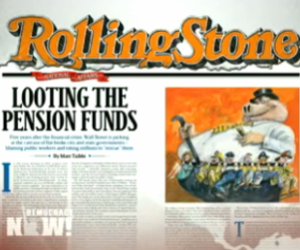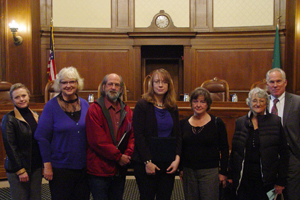STATE GOVERNMENT
Supreme Court urged to toss ‘raw deal’ on state workers’ pensions
The following is crossposted from the Federation Hotline of the Washington Federation of State Employees, Council 28:
OLYMPIA (Oct. 25, 2013) — Washington’s Supreme Court chambers were Ground Zero for the nationwide fight to save public employee pensions as the Federation and allies argued against the repeal of PERS 3 gainsharing, for the PERS 2 early retirement factors and against the repeal of the PERS 1 uniform cost-of-living adjustments (or “UCOLA”).
The court didn’t indicate when it would issue its decision on the cases.
 The Supreme Court hearing came as Rolling Stone magazine and others have blown the lid off who’s behind the attacks on public employee pensions: the very billionaires who caused the Great Recession in 2008. They’ve waged a campaign to brainwash many politicians so that “states all over the country are claiming they not only need to abrogate legally binding contracts with state workers but also should seize retirement money from widows to finance years of illegal loans, giant fees to billionaires… and billions in tax breaks,” Rolling Stone reported.
The Supreme Court hearing came as Rolling Stone magazine and others have blown the lid off who’s behind the attacks on public employee pensions: the very billionaires who caused the Great Recession in 2008. They’ve waged a campaign to brainwash many politicians so that “states all over the country are claiming they not only need to abrogate legally binding contracts with state workers but also should seize retirement money from widows to finance years of illegal loans, giant fees to billionaires… and billions in tax breaks,” Rolling Stone reported.
The Supreme Court hearing also came the same morning the corporate-dominated Seattle Times editorial board urged the justices to ignore the unions and retirees. The Times said it’s okay to attack the pensions to fund education and because the “pension goodies were not promises.”
The Seattle Times, the state and the billionaires all got it wrong.
“It’s about workers’ rights and having a middle class with benefits,” said Gwen Rench, who retired from DSHS and Local 843 in 1997.
Rench, now president of the Retired Public Employees Council of Washington (RPEC)/AFSCME, said she was appalled that state attorneys pitted taxpayers against “public employees who worked and were promised” the benefits. If the state prevails, it will accelerate the “push to poverty” for retirees.
PERS 2 retirees now make about $13,800 a year in pensions — not much higher than the federal poverty level, according to RPEC statistics.
Rench joined several other retired Federation members in the courtroom as attorneys for both sides argued their cases and took tough questions from the nine justices.

From left: Anita Hunter, WFSE/AFSCME attorney; M.K. Deacon, Local 843 (retired); Denny Johnson, Local 443 (retired); Maria Britton-Sipe, executive director, RPEC; Gwen Rench, RPEC President and Local 843 (retired); Nell Snodgrass, Local 304 (retired); and Ed Younglove, WFSE/AFSCME attorney
“In light of the drumbeat of attacks on public employee pensions, it’s important that we now return to first principles and those first principles are the constitutional underpinnings” of the gainsharing benefits enacted in 1998 but repealed in 2007, said James Oswald, attorney for one group of individual employees who brought suit, along with the Federation and the Washington Education Association.
“The reduction in a pension benefit violates the contracts clause” of the state Constitution, Oswald said.
Gainsharing started in 1998 to encourage state employees to join the then-new PERS 3 system. Under it, PERS 3 retirees would share extraordinary investment gains based on a set period of time and exceeding a certain percentage.
But the Legislature repealed gainsharing in 2007 and created earlier retirement benefits for PERS 2 members so they could retire at age 62 with 30 years of service with no benefit reduction.
The state is wrong that it could repeal the gainsharing and use the early retirement as a tradeoff, coalition attorneys argued.
But state attorneys argued gainsharing would only last until the Legislature repealed it — even though evidence presented to the court showed employees who opted into PERS 3 never knew gainsharing could go away.
A lower court ruled for the union to restore gainsharing but against it on the earlier retirement.
Federation Attorney Ed Younglove urged the Supreme Court to overturn the lower court on the early retirement factors – that it was wrong to include a “poison pill” in the 2007 legislation that said the early retirement would go away if gainsharing were ever reinstated.
Younglove said previous high court rulings backed the unions’ basic argument on reasonable expectations.
He said PERS 2 members have been paying for the early retirement factor through payroll deductions – but also paying for the PERS 3 early retirement as well.
“To date, they’ve paid over $370 million for these benefits,” Younglove said.
“For Plan 2 (members), these were a new benefit promised by their employer and that they paid for….
“Our case boils down to its essence is people have a reasonable expectation to get what they paid for. These employees have been paying for these benefits for six years now and it’s totaled $370 million….
“This court’s focus…should be on what was their reasonable expectation when they worked expecting to be able to take advantage of this early retirement benefit if they qualified.”
On the PERS 1 UCOLA case argued immediately after the gainsharing/early retirement factor case, the state, again, argued that the Uniform Cost-of-Living Adjustment enacted in 1995 was never meant to be permanent, either.
But RPEC attorney Richard Spoonemore, speaking for the coalition that includes the Federation and WEA, said the UCOLA was a tradeoff. Previous COLAs were repealed and in their place, the Uniform COLA would bring an automatic, annual COLA for PERS 1 retirees. It is paid in the first calendar year in which the recipient turns age 66 and has been retired for one year. The amount of the payment is a fixed dollar amount multiplied by the member’s total years of service.
Some PERS 1 members who’ve retired have gotten some of that benefit or from previous COLAs, Spoonemore said.
But for the 40 percent who haven’t retired, “their benefit will never keep up with inflation” if the UCOLA is repealed, he said.
PERS 1 covers state employees hired before October 1977.
“I thought when I retired that I would be getting a COLA for as long as I was retired and now they are taking it away? Not fair,” retiree Nell Snodgrass said after the hearings ended. She retired from Seattle Community College and Local 304 in 1992.
“I don’t think you can throw a carrot out there and then take it away at a later date,” said Denny Johnston, who retired from the Department of Corrections and Local 443 in 2009. Johnston retired under the early retirement factors and is concerned about current state employees who might lose that option if the state prevails in court.
Another DSHS retiree from Local 843, M.K. Deacon, said she doesn’t know what went through legislators’ minds when they enacted these pension takeaways.
“But I think it’s a raw deal,” said Deacon, who retired in 2002.





